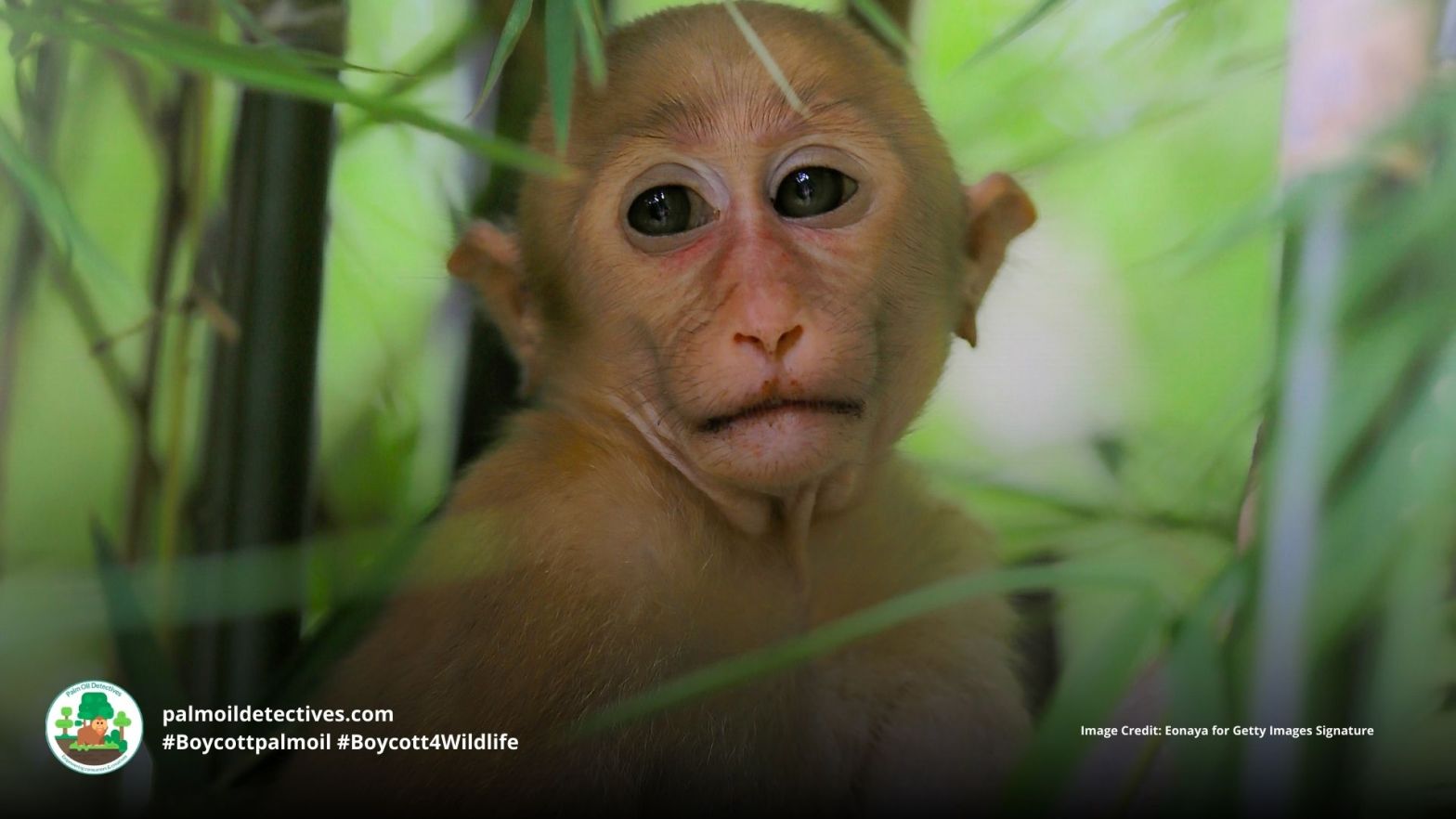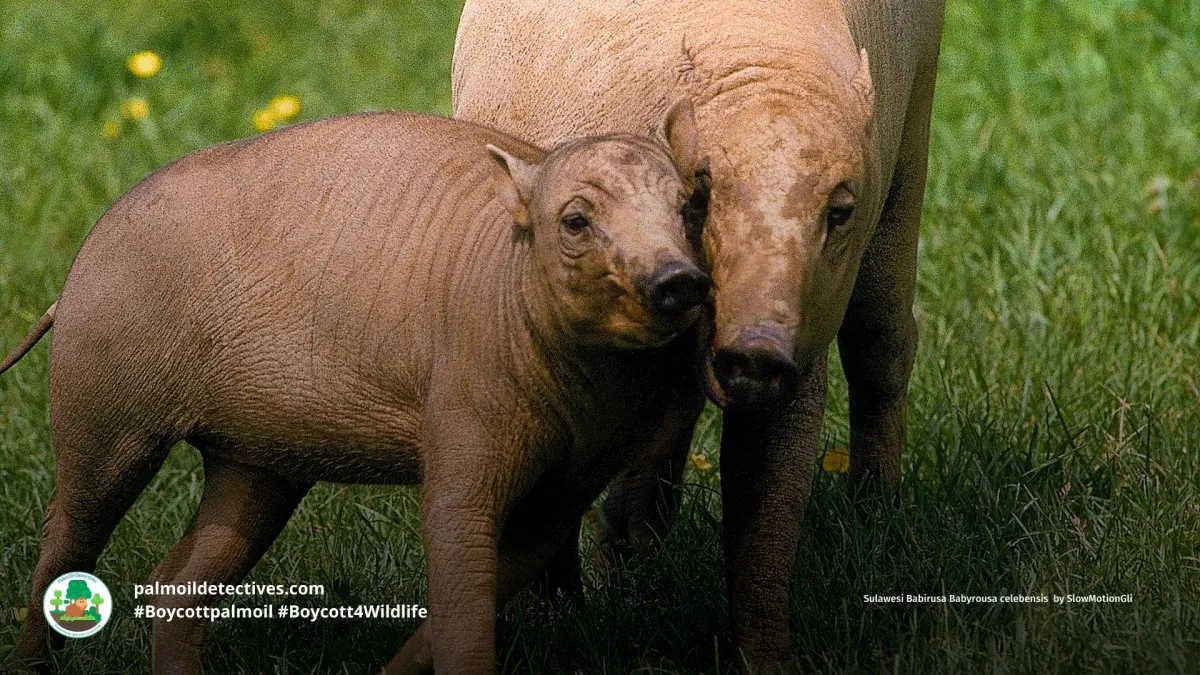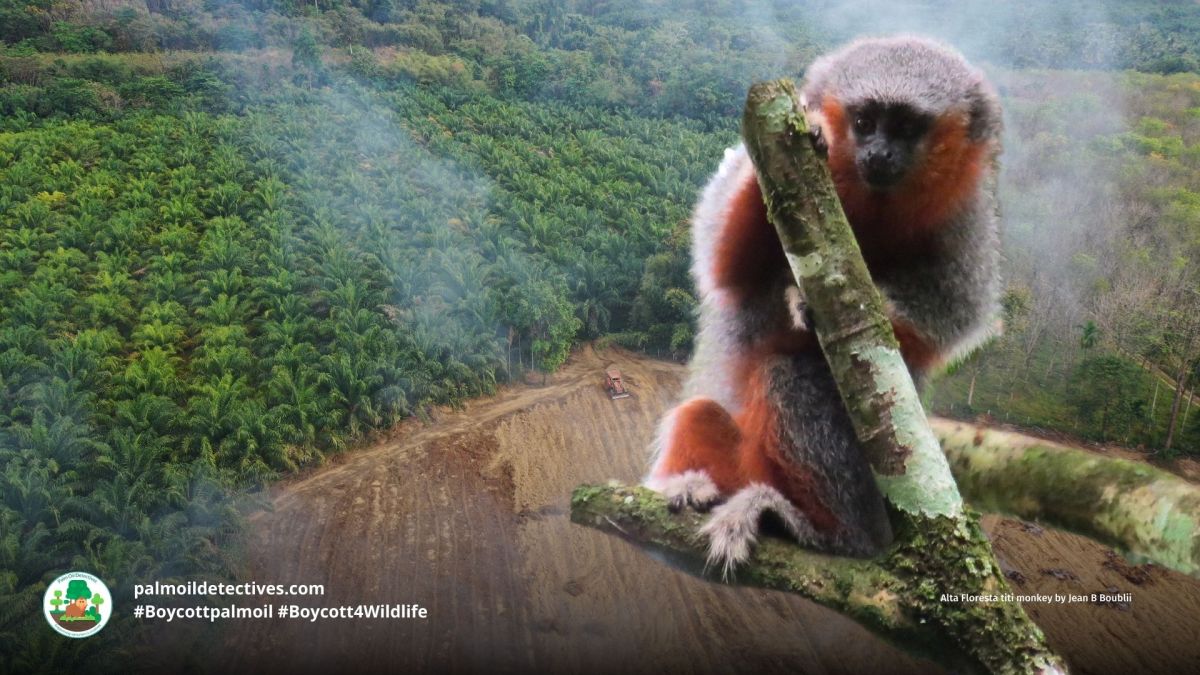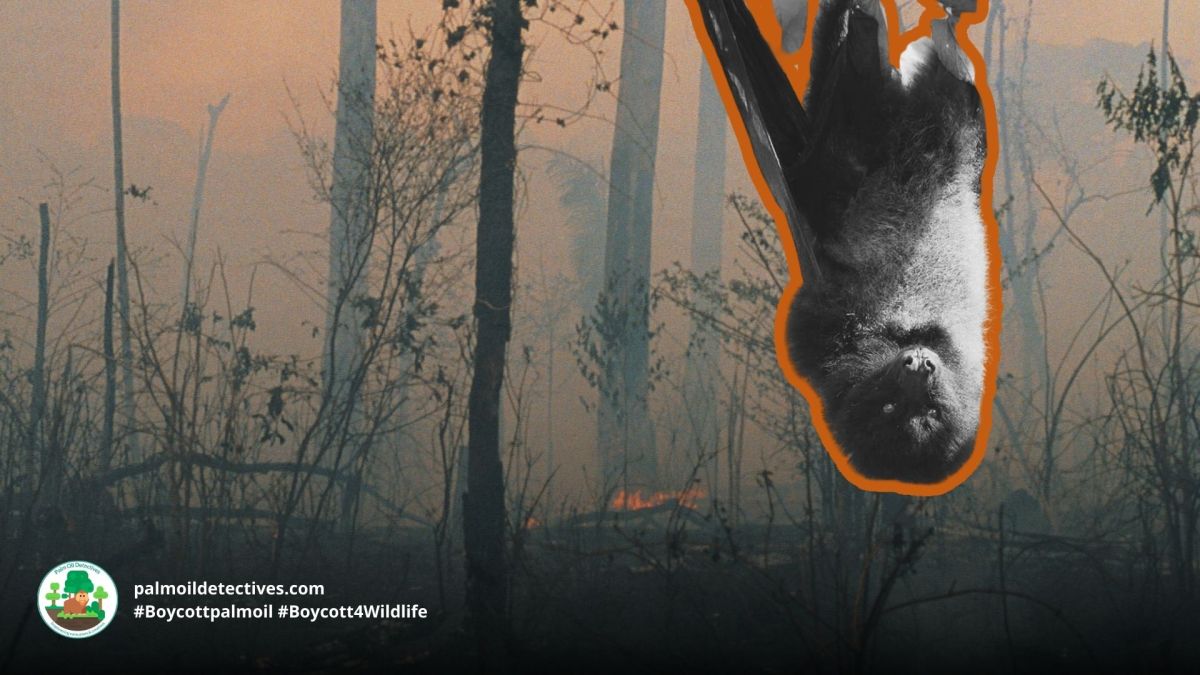In Peninsular Malaysia, a new study published in Cell Biology by a team led by Dr Anna Holzner of German Centre for Integrative Biodiversity Research (iDiv) Halle-Jena-Leipzig has found that infant mortality rates among wild southern pig-tailed macaques are alarmingly high due to frequent visits to oil palm plantations.
These plantations expose the infants to increased risks from predators, human encounters, and harmful agricultural chemicals, potentially affecting the development and survival of infant macaques. The study, conducted in collaboration of international researchers, observed that prolonged exposure to these plantations during infancy triples the likelihood of death.
The study suggests that pesticides used in agriculture could cross the placental barrier or be transmitted through breastmilk, impacting fetal development and health. This significant research underlines the urgent need for eco-friendly agricultural practices to protect wildlife and human communities near plantations. Take action and join the movement to #Boycottpalmoil and #Boycott4Wildlife every time you shop!
#News: #Research in Current Biology finds infant pigtailed #macaques visiting #palmoil #plantations 3 x more likely to die young from #pesticide poisoning. #Agricultural #chemicals are detrimental to infant development #Boycottpalmoil #Boycott4Wildlife https://wp.me/pcFhgU-7aa
It’s not just #orangutans – countless #rainforest animals are at risk from #oilpalm. A recent #study in Cell Biology confirms #macaque babies 3 x more likely to die from palm oil #pesticide poisoning #Boycottpalmoil #Boycott4Wildlife via @palmoildetect https://wp.me/pcFhgU-7aa
Anna Holzner, Nurul Iza Adrina Mohd Rameli, Nadine Ruppert, Anja Widdig (2024): Agricultural habitat use affects infant survivorship in an endangered macaque species. Current Biology, DOI: 10.1016/j.cub.2023.12.002. Media release published by German Centre for Integrative Biodiversity Research (iDiv)
Halle-Jena-Leipzig, 8th January, 2024, read original.
Study reveals link between frequent plantation visits and infant mortality in wild southern pig-tailed macaques in Peninsular Malaysia
Frequent visits to oil palm plantations are leading to a sharp increase in mortality rates among infant southern pig-tailed macaques (Macaca nemestrina) in the wild, according to a new study published in Current Biology. In addition to increased risk from predators and human encounters, exposure to harmful agricultural chemicals in this environment may negatively affect infant development.
In wild populations, infant survival is crucial for determining individual fitness and for maintaining viable populations in changing environments. For primates, agricultural areas adjacent to tropical forest habitat can be a mixed blessing: While crop plantations can provide easy access to food, they also come with increased exposure to various hazards, which is likely contributing to reduced infant survival in several wild primate species.
Exposure to palm plantations increases infant mortality
In a long-term collaboration between Universiti Sains Malaysia (USM), the German Centre for Integrative Biodiversity Research (iDiv), Leipzig University (UL), and the Max Planck Institute for Evolutionary Anthropology (MPI EVA), researchers set out to investigate potential links between frequent visits to oil palm plantations and the particularly high infant mortality they observed among wild southern pig-tailed macaques in Peninsular Malaysia. In a habituated study population in this region, 57% of all infants born between 2014 and 2023 died before the age of one – a rate that far exceeds mortality rates reported in other wild primate populations.
For almost ten years, the researchers followed two groups of macaques living in a mosaic of rainforest and oil palm plantations. They found that prolonged exposure to oil palm plantations during infancy tripled the likelihood of infant mortality. This key finding could be explained by increased encounters with predators and humans, and potential exposure to harmful chemicals such as pesticides in this environment.
“Some of these risks are relatively clear: infant macaques are more likely to fall prey to feral dogs that roam in the plantations in packs or to be captured by humans and sold illegally as pets,” explains Dr Nadine Ruppert from USM, who established and leads the field site. “But the potential long-term effects of the pesticides used to manage the monocultures on mammalian wildlife are much less obvious and very poorly understood.”






Pesticides may affect foetal development
The study also found increased infant mortality rates when mothers gave birth for the first time or when there was a long interval between two consecutives births, which contradicts studies that report increased mortality when the interbirth interval is shorter. The accumulation or uptake of pesticides in the mother’s body may play a key role: “The literature suggests that certain harmful substances used in agriculture can cross the placental barrier and be passed on to the unborn offspring. We also know that certain fat-soluble molecules can be passed on through breastmilk,” says lead author Dr Anna Holzner (iDiv, MPI EVA, UL and USM). “Accordingly, the longer the chemicals accumulate in the mother’s body, the more they could influence foetal development during pregnancy and also during lactation.”
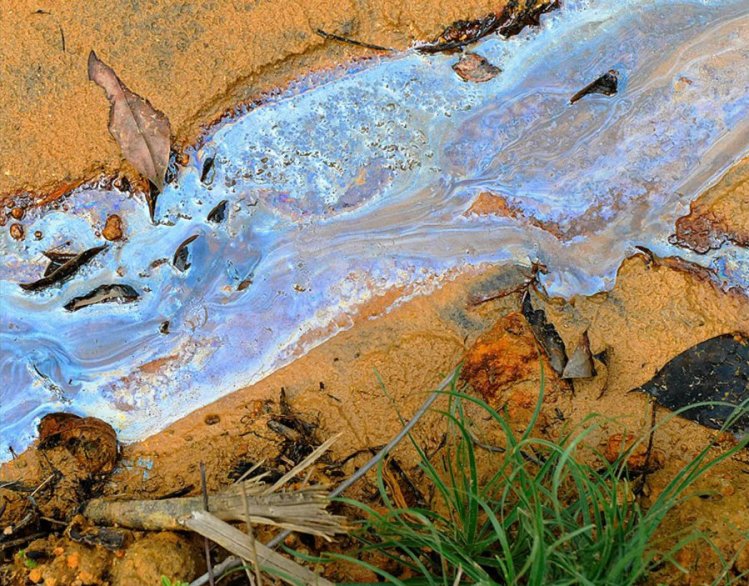
The study highlights the urgent need to address anthropogenic threats to animals in agricultural landscapes. “We know that the use of pesticides in agriculture has led to drastic declines in insect populations, so chemical analysis is essential to understand the effects of pesticides on mammalian wildlife,” says Professor Dr Anja Widdig (UL, MPI EVA and iDiv), senior author and leading PI in this iDiv Flexpool project. “Our findings underscore the critical need to implement environmentally friendly cultivation practices that minimise the risks to wildlife populations and also to people living near plantations.”
Anna Holzner, Nurul Iza Adrina Mohd Rameli, Nadine Ruppert, Anja Widdig (2024): Agricultural habitat use affects infant survivorship in an endangered macaque species. Current Biology, DOI: 10.1016/j.cub.2023.12.002. Media release published by German Centre for Integrative Biodiversity Research (iDiv)
Halle-Jena-Leipzig, 8th January, 2024, read original.
ENDS
Learn about other animals endangered by palm oil and other agriculture
Learn about “sustainable” palm oil greenwashing
Read more about RSPO greenwashing
A 2019 World Health Organisation (WHO) report into the palm oil industry and RSPO finds extensive greenwashing of palm oil deforestation and the murder of endangered animals (i.e. biodiversity loss)
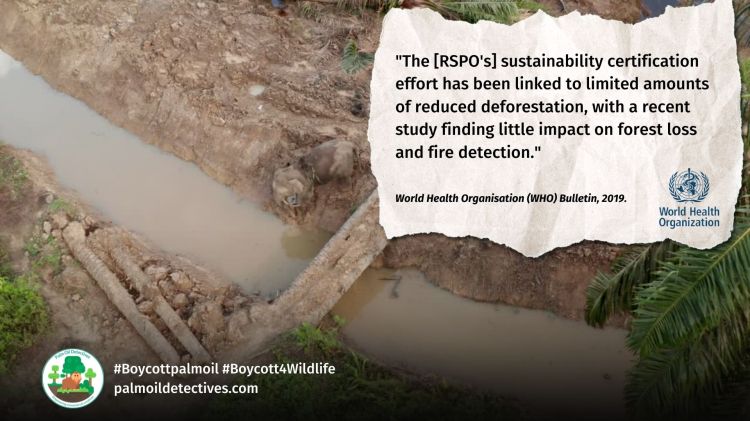

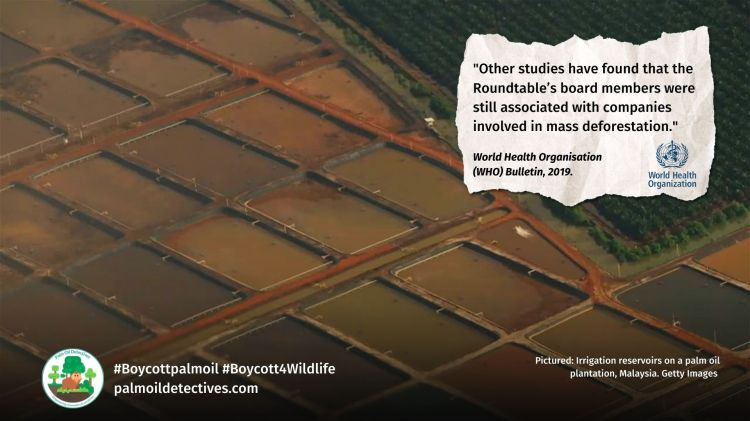
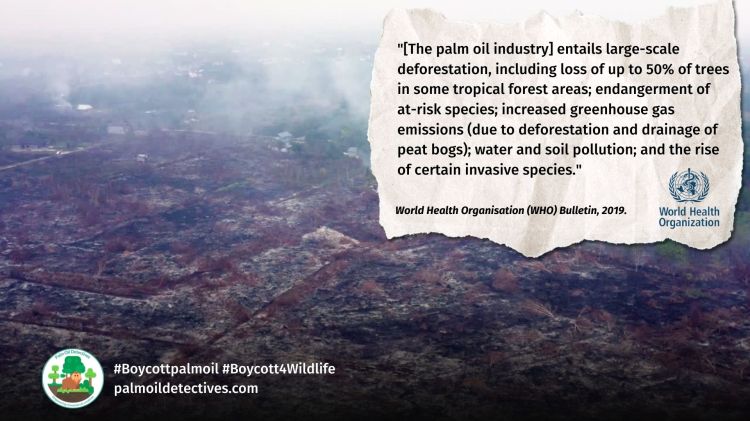
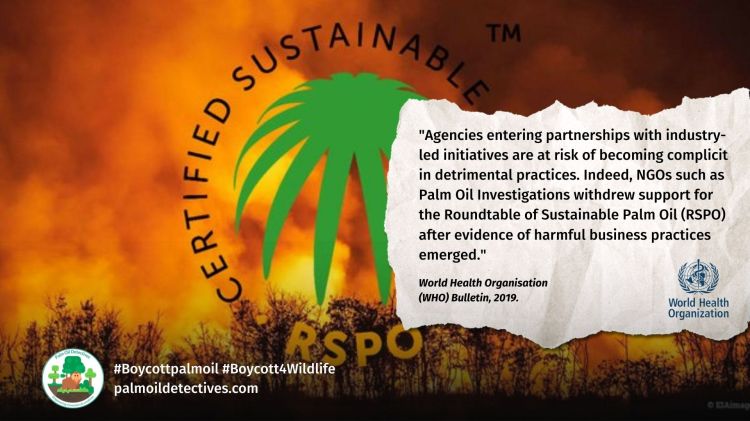
Contribute in five ways
1. Join the #Boycott4Wildlife on social media and subscribe to stay in the loop: Share posts from this website to your own network on Twitter, Mastadon, Instagram, Facebook and Youtube using the hashtags #Boycottpalmoil #Boycott4Wildlife.
2. Contribute stories: Academics, conservationists, scientists, indigenous rights advocates and animal rights advocates working to expose the corruption of the palm oil industry or to save animals can contribute stories to the website.
3. Supermarket sleuthing: Next time you’re in the supermarket, take photos of products containing palm oil. Share these to social media along with the hashtags to call out the greenwashing and ecocide of the brands who use palm oil. You can also take photos of palm oil free products and congratulate brands when they go palm oil free.
4. Take to the streets: Get in touch with Palm Oil Detectives to find out more.
5. Donate: Make a one-off or monthly donation to Palm Oil Detectives as a way of saying thank you and to help pay for ongoing running costs of the website and social media campaigns. Donate here

